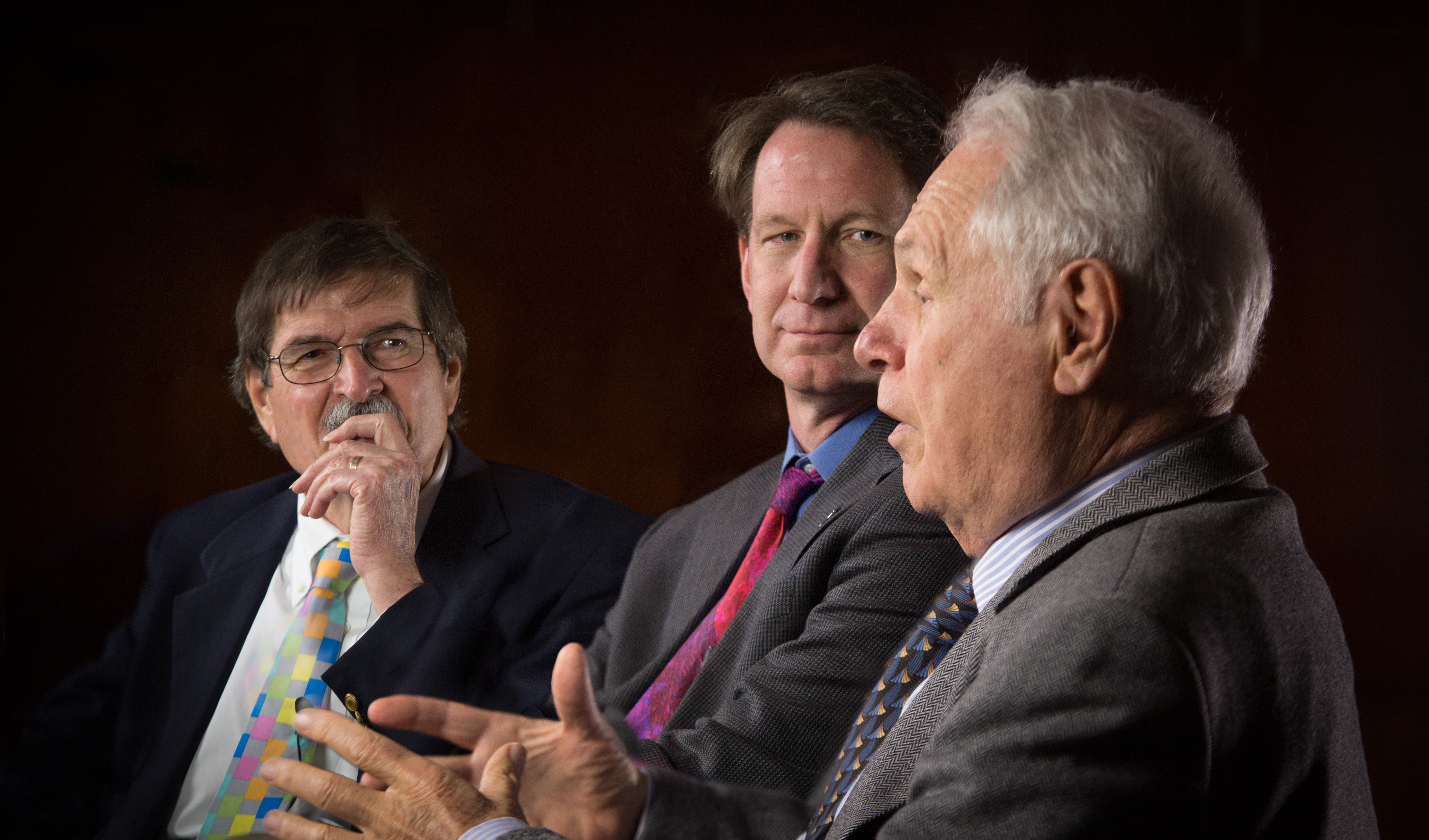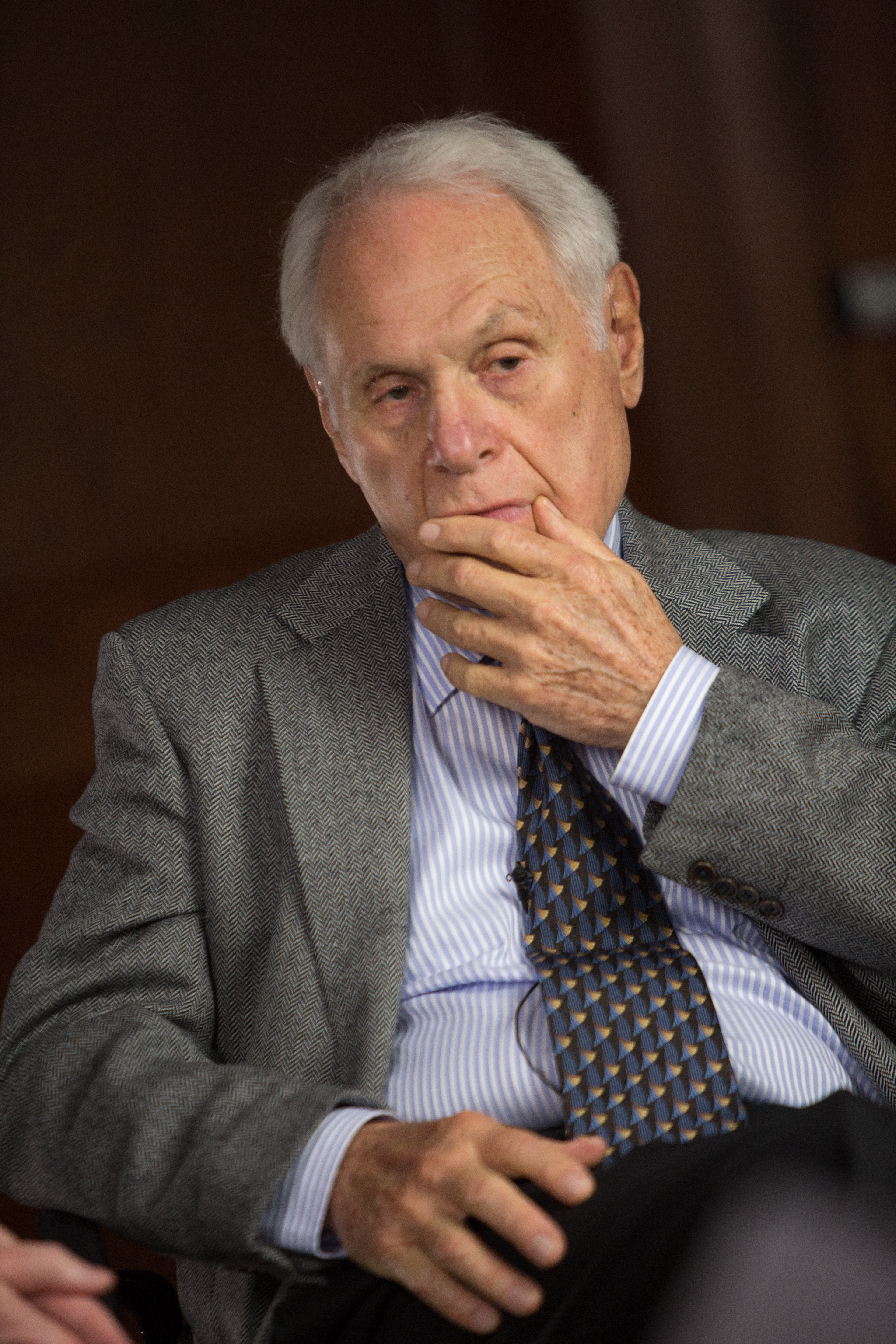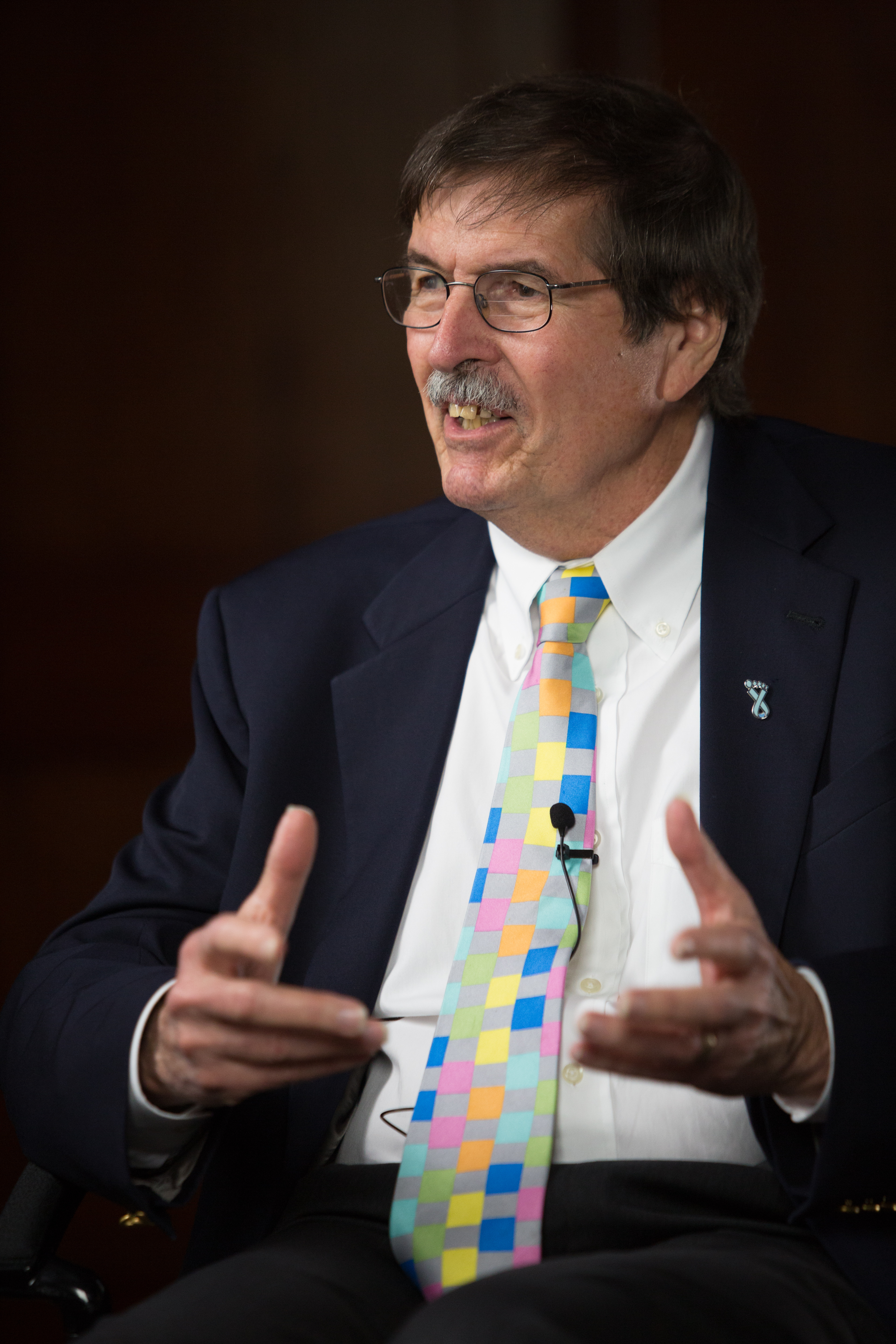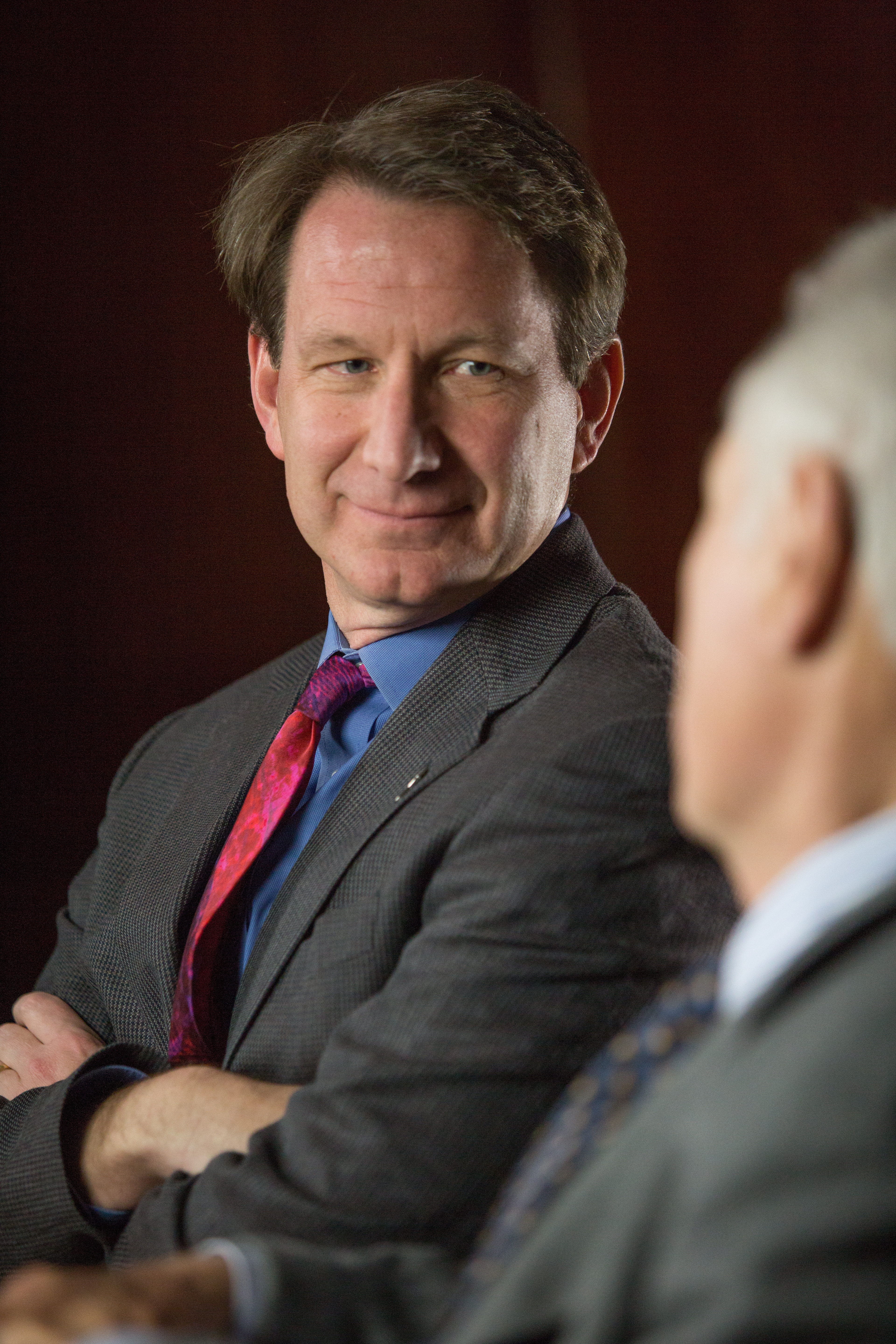In 1975, UNC Lineberger was named a “Designated Cancer Center” by the prestigious National Cancer Institute, a title that signifies we are an organization delivering high-level cancer care to patients throughout our community, state and nation. Most NCI-Designated Cancer Centers are affiliated with university medical centers, although several are freestanding centers that engage only in cancer research.

CL: How did you become the first director of the cancer center, Joe?
Joe: I came to Carolina in 1965 as head of infectious diseases and was studying a tumor virus that actually could transform human cells, which was extremely interesting. That was my segue into cancer research. Chris Fordham was the dean of UNC’s medical school at the time, and he said, “Look, Joe, I want you to be the director of our new cancer center.” But the cancer center didn’t even exist! He told me to do whatever I needed to do to get it started. So I gave up my post, just like that. We built the cancer center from the ground up. I started recruiting, and that was really fun because there is one thing that I always loved to do, and that was to bring the best possible people to Chapel Hill.
CL: Shelley and Ned, tell us about your respective paths to UNC. How did you end up here?

Shelley: I came to medical school at UNC in 1966, and I grew to love Chapel Hill as well. I was away for a couple of years in the Army and then I had the opportunity to come back as a house officer, or a resident in today’s terms. I finished my training, and I became a physician-scientist, which was a little easier to do in those days. I had the privilege of meeting Joe Pagano, who was looking for like-minded physician-scientists to help him develop the basic and translational side of the cancer center. Joe asked me to join in his work, and pretty soon I was helping him write core grants.
I guess you’d say the rest is history. I learned from Joe during the 80’s and 90’s, and then had the really great fortune to succeed him as director of the cancer center in 1997. After 16 years, I turned things over to Ned Sharpless. I still have the title of director of UNC Cancer Care, so I work on clinical issues, particularly throughout the UNC healthcare system. I still run a lab and do many of the things I’ve done for almost 50 years.
Ned: I grew up in Greensboro, and both my parents were UNC alumni as well as two of my three siblings. So I came to UNC for undergraduate as a Morehead Scholar and attended medical school here. Then I left to work at various Harvard Medical School hospitals where I did my residency and fellowship and spent a decade at Harvard. I had been trained as a medical oncologist, so when I was ready to move on in my career, I asked both my clinical mentor and my scientific mentor where I should look for jobs. Each made various suggestions, but their common suggestion was the University of North Carolina.
So I decided I’d come back down, and I saw that in the 10 years I’d been away, the campus had added over $1 billion worth of new research buildings. The in-house funding had more than doubled, and there was a mass influx of terrific scientists. The clinical operation had probably grown 10 times as big on the clinical oncology side, and it was really an impressive place.
My scientific interest was in the basic biology of carcinogenesis, and UNC was a really strong environment in that respect. And in the end, the prospect of free child care with my parents living just an hour away sealed the deal, so I was recruited back to UNC by Shelley. I started my lab and began seeing patients, including those with leukemia. I really had a great time. My lab grew in size, and then I started taking on an administrative role at the cancer center as the deputy director. Then two years ago I became the cancer center director.
CL: Carolina has a special sort of atmosphere; people seem to be drawn to it. Do you all think that’s one of the reasons why there are researchers and physicians here that could truly go anywhere in the world to practice, but they choose Carolina?

Shelley: You know, we’re now in the top 10 of NIH funding. So how many places can you be in the top 10 scientifically, buy a house, live 10 to 15 minutes from where you work, and send your children to public schools? There just aren’t many places like that. And this is a really great place to be junior faculty and to start your career.
At some institutions, there’s a ‘sink or swim’ environment, or you have leaders who tell you exactly what you’ve got to do and you’re not given adequate scientific freedom. But UNC has always realized that junior scientists need a bit of freedom to do what they want to do, protected time so they can get their work done, and at the same time receive mentoring and support. It’s really the right balance. So people come here to start their career, they’re very successful, and they don’t want to leave.
Joe: I agree. You could say that people are drawn to our special brand of Southern hospitality here in Chapel Hill, but there’s also a unique type of professional collaboration that takes place at our cancer center. We’re not organized by department here, but rather by areas of discovery and research interest.
So researchers and physicians don’t choose to work here because of a specific department; they come here because of their particular expertise in cancer or their curiosity regarding the origins of cancer. People work together in a way that produces a whole different dimension of success. I’d call it innovative and transformative, a different way of thinking.
CL: Many national leaders involved in cancer research believe we’re entering a golden age of opportunity to battle different types of cancer. How accurate is that claim?
Ned: There certainly has been incredible progress. I think a little-known fact is that the incidence of cancer mortality has gone down a couple of percent every year for the last 20 years in United States, and over time, that’s really added up. But there are some obstacles, including a massive increase in cancer instances as the country’s population ages. This is despite impressive new therapies, some of which work quite well.
People work together in a way that produces a whole different dimension of success. I’d call it innovative and transformative, a different way of thinking.
There are still lots of patients who don’t benefit from these therapies, and we still have too many patients that we can’t help. So I think it’s a really exciting time to be in cancer research and to be a clinical oncologist. There are some great new treatments that have been approved and more in the pipeline, but I’m also sure that cancer is going to remain a significant problem for a while. So this golden age will have to be a long one to really make the progress we want to make.
Shelley: Ned’s caution is very real. Lung cancer, pancreatic cancer and ovarian cancer frequently spread, making it very difficult to treat. Sometime in 2005, the director of the NCI said we’d rid cancer suffering within a decade. That has clearly not happened, so it’s a really terrible problem. The good news is that we have much better scientific understanding of the disease, much better capabilities and much better technology.
But the thing we’ve learned in that period is that the complexity of cancer is much greater than we’d expected. It’s not one disease, it’s thousands of diseases, and they all have specific difficult issues about them that make each one of them hard to cure and solve exactly. We’ve made a lot of great progress and we have a tremendous understanding of the basic biology of cancer, but we can’t really over-promise our patients the way some would want.
CL: Wow, 40 years as an NCI-designated cancer center – that’s a milestone! Could you tell us how cancer care used to be provided versus how it’s provided now?

Ned: I think one of the under-appreciated aspects of cancer therapy is how much better we’re doing it with regards to the patient and their quality of life. Within the last 15 years, we’ve seen chemotherapy go from being a very difficult thing for patients with horrible side effects, to being much better tolerated because of the clinical research that’s taken place. Also, rather than cancer care just being about the medicines and therapy, there’s also the whole mind/ body/ soul approach.
UNC Lineberger, together with the North Carolina Cancer Hospital, really approaches it from a whole-person perspective. So now when patients come to the hospital for treatment, they see the entire caregiving team, all in the same visit.
CL: How has the University Cancer Research Fund (UCRF) impacted cancer care at UNC?
Shelley: We’ve had remarkable support from the state, starting with Mark Basnight and Tony Rand and continuing with the current legislature. They knew that UNC has always taken excellent care of people, regardless of their ability to pay. But in 2007, we were bursting at the seams! Our legislature came to the rescue and built this wonderful North Carolina Cancer Hospital. Before that, a bond issue allowed us to expand the Lineberger Building and other facilities.
As we’ve grown, the state has invested in us, both on the clinical side and on the scientific side. It’s been a clear win in terms of return on investment, raising over $7 for every dollar the state has invested through UCRF. But while UCRF has made our research more prominent nationally, it has not taken away the need for private philanthropy.
CL: We receive generous philanthropic support for our cancer center, and we’re very grateful for that. What do these gifts mean to UNC Lineberger?
Ned: Many donors are patients themselves or are family members of patients, and they’ve realized that Lineberger is good for the State of North Carolina. It’s something they want to invest in, and the better we are clinically, the more people want to support us. That’s led to a rapid increase in our ability to raise philanthropic dollars, which are absolutely critical.
Grant funding from the state government is very important to our state mission, but often those dollars are used for very discrete, earmarked purposes. They’re not the kind of funds one can use to do those crazy, pie-in-the-sky, innovative ideas that are game-changers, that are really going to make the most impact on how we treat patients with cancer. Philanthropic dollars also provide the capital to buy a new key piece of equipment or even space in some instances, and it’s just absolutely vital to allow us to recruit and retain the best faculty. As the cancer center director, I’ve had the opportunity to speak with donors about the great things that are going on at Lineberger and to ask them for their support.
CL: Shelley, do you have one proudest UNC Lineberger moment?
Shelley (laughing): That’s like asking me to choose between my children! Wow…of course, my own lab is very close to my heart, but I think it would have to be the development of our clinical programs. To watch our clinical care evolve has been amazing. We’ve gone from seeing 1,400 patients a year to seeing 5,000 patients a year, and on top of that, getting a beautiful new building in which to care for them.
I’m proud to be part the University of North Carolina and to have the opportunity to build a program that is second to none in the country in terms of what we can do for patients, and the way in which we do it.
CL: So Ned, what are three words or thoughts that come to mind when you think of UNC Lineberger?
Ned: Cutting edge science, marvelous, humane clinical care and transformative training are the three things that I think we really do well, and that’s what comes to mind when I think of what this institution is all about.
CL: What about you, Joe?
Ned (laughing): I’m going to tell you right now, you’re not keeping Joe to three words!
Joe (laughing): I’d have to say interdisciplinary collaboration, our knowledge of cancer genetics, and the quality of our faculty and their breadth of vision. These are the great hallmarks of UNC Lineberger.
This interview has been condensed and edited.
